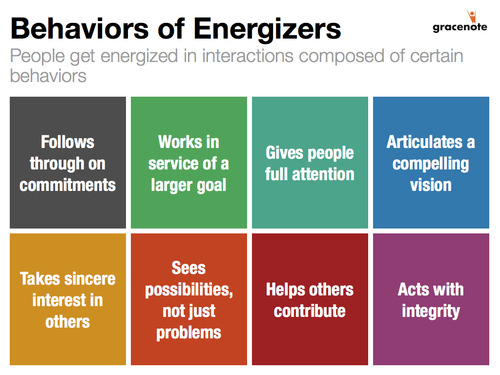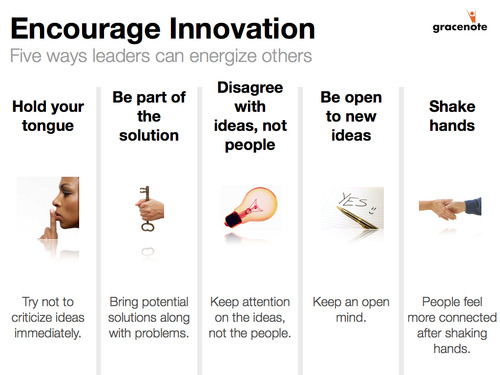Making the Invisible Visible
I recently read an excellent post by Jeanne Bliss, The Power of Suspending Cynicism in Business, and it served as a reminder of the importance of energy and energizers in both business and innovation. Jeanne shares examples of the benefits that result when businesses decide to trust and believe in their customers and employees. Research confirms that there are specific behaviors that energize others and fuel creativity, innovation and results.
Energy and Networks
Several years ago Rob Cross, a professor at the University of Virginia, conducted ground-breaking research into social networks. He was curious to understand why some groups thrived and produced great results while others struggled. By mapping the social interactions among individuals within organizations, Rob was able to visualize and analyze these networks. The research revealed what many wise business leaders had long suspected—that energy plays a key role in who is effective at work and why.
Our Behaviors Energize or De-energize
They found that energy and the ability to energize others isn’t rooted in personality. One doesn’t necessarily need to be outgoing or charismatic to energize others. Rob found that quiet, soft-spoken individuals could also be energizers. The key to energy, they found, was rooted in behaviors.

Much of Rob’s research is described in his book, The Hidden Power of Social Networks, which he wrote with Andrew Parker of Stanford.
Developing an Innovation Environment
So, what should leaders do if they’d like to energize others and foster an environment conducive to innovation? Here are a few simple things to try.

“Act as if what you do makes a difference. It does.” – William James
Every organization has an abundance of good ideas. Yes, right now, within your own organization, synapses are firing, conversations are happening, creative brainstorms are occurring. Will these ideas ever see the light of day? Will people feel comfortable sharing them, confident that they can make a difference? Or, will they be withheld? Will their originators feel rejection and criticism? Will they fear the “corporate black hole” into which great ideas flow and never again emerge?
Having a great idea doesn’t amount to much if you’re unable to motivate others to take interest, believe in the idea, and take action. Energy plays a substantial role in generating those ideas and making it possible to implement them. Armed with this insight, how will you energize others and encourage innovation in your organization?



